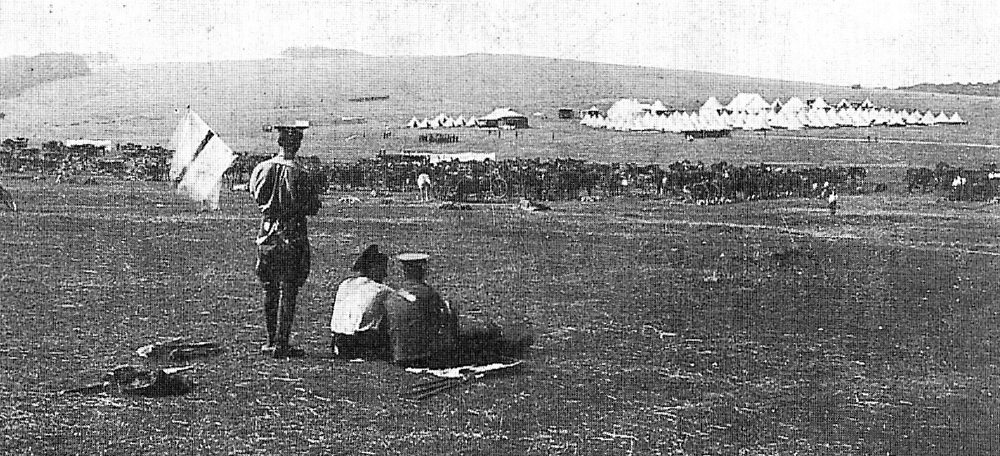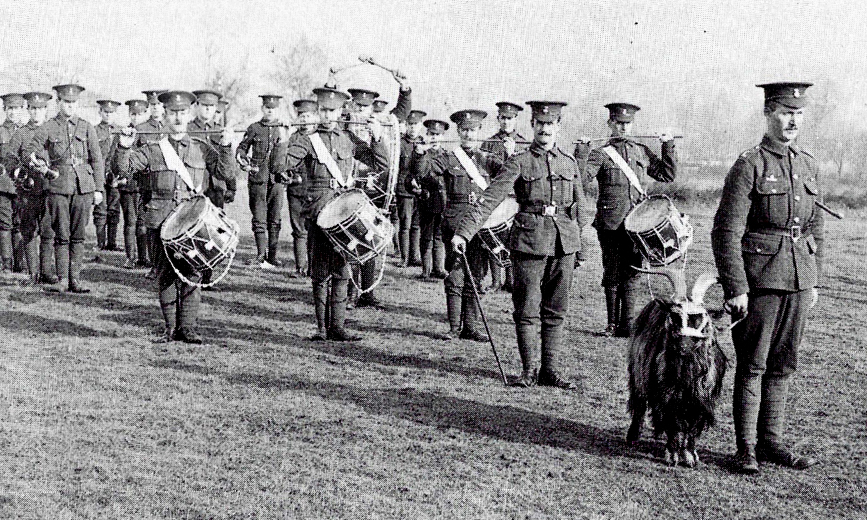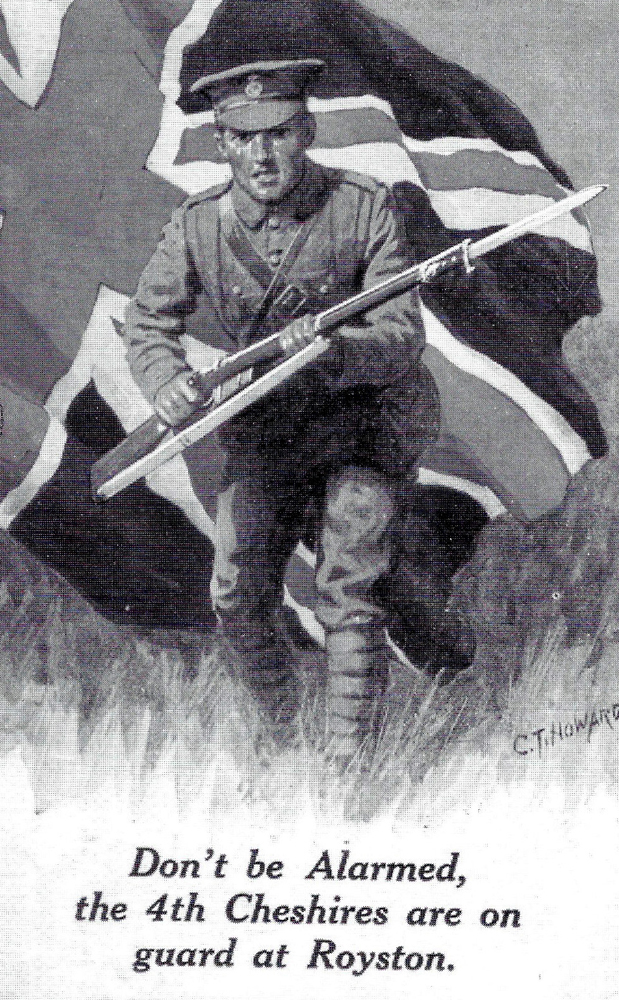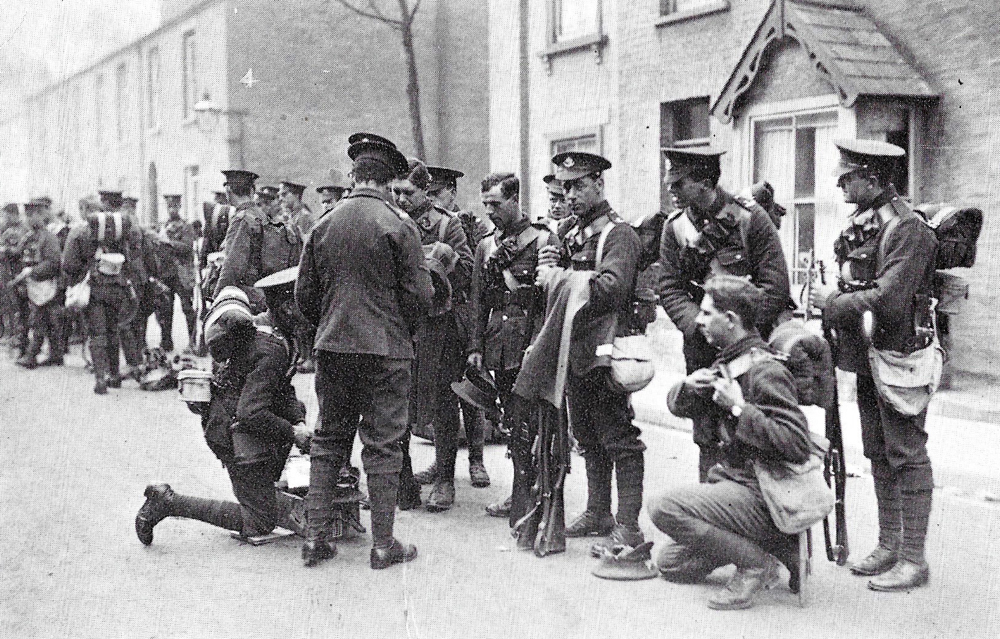World War I - Troops and refugees arrive
Arrival of the troops

Troop encampment on Therfield Heath at the bottom of One Hill near the cricket pavilion (in the centre of the picture)
At the outbreak of the war Royston was a town of approximately 4,000 inhabitants.
Between September 1914 and May 1915 up to 5,000 men passed through the town, at one point nearly doubling its population.
February 1915
Royal Field Artillery and Welsh Fusiliers
The first to arrive were the men and equipment of the Royal Field Artillery and the Officer Training Corp from Cambridge University.
In February 1915, officers and men of the 5th Battalion, Royal Welsh Fusiliers were billeted with the town’s inhabitants, having marched from Cambridge in heavy rain. All the men found homes willing to take them in and public buildings were only used for mess rooms, etc. These included several of the buildings to which the children of the Queens Road Schools were to be transferred when their buildings were requisitioned for the Auxiliary Hospital.
The Royston Crow of 12th February reports that, with reveille being sounded at 6.45 every morning, the town woke up somewhat earlier than it was used to.

That edition of the Crow’s report also mentions that, when parading from the town to the heath, the Battalion is lead by the bugles and drums and its mascot, “a fine old goat with gilded horns, which was presented to the Battalion during their stay in Northampton”.
Several entries in the Royston Crow for the following week are of interest.
Town band
On Monday some of the members of the town band were joined by members of the Royal Welsh Fusiliers playing a selection of songs at the Cross.
Church parades
Parades and services were to be held on Sunday at the Catholic and Parish Churches for members of the Royal Welsh Fusiliers billeted in the town.
Address in Welsh
Rev. J Lloyd-Evans is to give an address in Welsh on Sunday afternoon, and has found several members of the Regiment in the town whom he had baptised in his church in Wales.
March 1915
Cheshire Regiment

After a five week stay, and much to the disappointment of the people of Royston, the Royal Welsh Fusiliers left the town, returning to Cambridge.
A further invasion took place very shortly after their departure with the arrival of the 1st/4th Battalion, Cheshire Regiment together with a few men from the 6th/7th Battalion. The two regiments passed each other on their marches at Foxton.
The Cheshires remained for more than seven weeks. The 1st/4th Battalion were billeted in the places vacated by the departing Fusiliers, while the 6th/7th Battalion (Machine Gun Section) were accommodated at the Union Workhouse in Baldock Street.

One of the Cheshires, John James Atkins [51113], wrote in his diary -
"While at Northampton we were billeted at St. James End until we had completed our firing course. Then it was back to Cambridge again to re-join the Battalion. A short while afterwards the Battalion moves off to Royston, about thirteen miles from Cambridge. We were in billets while stationed there. One fatigue I remember while there was taking ration round on a handcart, at tea time, to the different billets. After a short stay here, the battalion moved on to Bedford, a distance of just over 25 miles. Quite a march on a warm day and quite a few fell by the roadside. We were carrying everything I think except steel helmets, as they weren’t in issue yet."
April 1915
Further Welsh Regiments
The town had to find space for further men in March with the arrival of more Welsh Regiments. On Friday, 30th April the Crow reported -
"Once again the slopes of Royston Heath are dotted with tents and the smoke of the camp fire is to be seen rising above the scene of activity.
"On Friday last, advanced parties arrived and the camping ground was staked out. Later a tent here and there sprang up and on Sunday a field ambulance R.A.M.C. put in an appearance and now the Red Cross flag is in their lines beyond and to the north of the Cricket Pavilion.
"On Tuesday morning the first train arrived with men from Wales. Other trains arrived at intervals during the morning. The last to arrive about midday, bringing some of the men of the Principality who had been spending the interim guarding some important points in Scotland."
The Belgian Refugees
In the early months of the war, following the invasion of their country by the German army, Belgian refugees started to arrive in England.
Over the course of the war approximately 60,000 Belgian refugees made a home in this country with some 2,000 establishing themselves in Letchworth.
Royston also accommodated its share. The Crow edition of 16th October 1914 had the following article -
"By the generosity of the townspeople, a house on the Old North Road has been furnished and provision made for the reception of Belgian refugees. The first contingent arrived on Saturday and were met by the Chairman of the District Council and others.
"The family now in residence consists of a father with his two sons, a daughter and a daughter-in-law. They had a large butcher's business in Malines, and have left everything they possessed. Two more families are expected to arrive shortly.
"There are also two families from Antwerp, who are guests of ladies and gentlemen in the town."
The Bosmans family mentioned in the above article were, by accident, to appear in the town’s history again.
Mr. Charles Wood, of Leinster Road, who sent some clothing with the consignment forward from Christchurch for the Belgian refugees, received by the last mail a letter and two cards, which had been inadvertently left in one pocket of a coat, together with the following communication (accompanying this was a note in French to the same effect, but perfectly expressed) -
An article which appeared in New Zealand on 17th July 1915 recounts the following -
Royston, June 4th, 1915
Dear Sir,
I enclose here a letter and two cards which were in a pocket of a grey coat. The same time I have the occassion to thank you very much, because you had think on the refugees. I live here in Royston with my father and sister, his father is 85 years old, and my brother and his wife. We are in Belgium merchant-butchers, and my brother was a dealer, too.
Because I had not too much clothings with me, I wrote to the Warwick Square to have some clothing, and it is now just a good luck that I have found here in a pocket what I send to you now.
Again thank you for your kindness.
If sometimes you had some linen (underclothes) what you did no more use, you could always send it to on to this address.
Yours very truly,
Vincent Bosmans, Old North Road, Royston, Herts.
P.S.
Because we are all destroyed, we are obliged to accept all now, and here we cannot work because there is no work in our profession. Excuse me for the faults they could be in my letter. A little patience again.